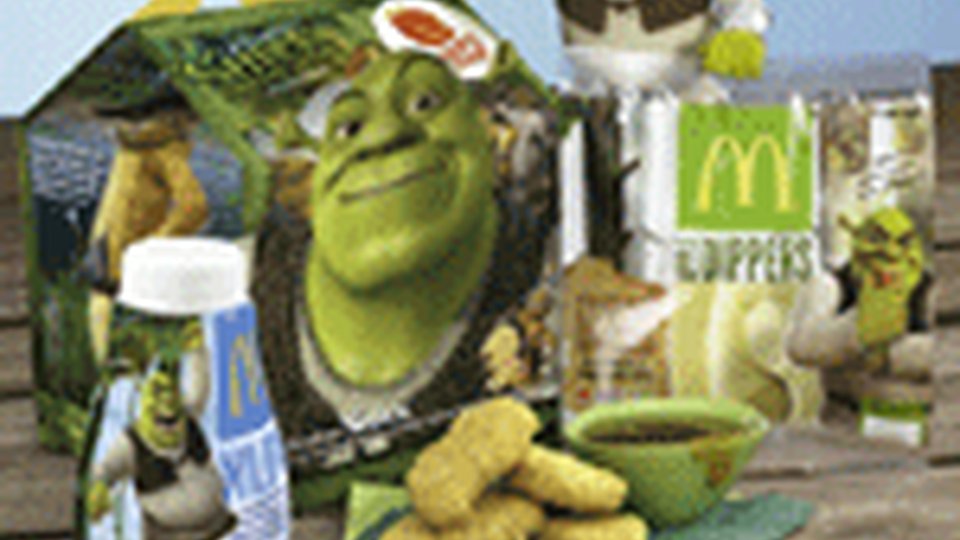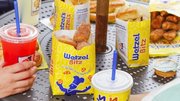Article
Should McDonald's help solve the childhood obesity epidemic?
With its marketing prowess, the chain certainly has the ability to be a change agent. But does it need to?

June 21, 2010
Ronald McDonald and McDonald's Happy Meals seem to be easy targets these days. Earlier this year, a consumer watchdog group condemned Ronald McDonald — and other such mascots — for promoting unhealthy food and asked the company to retire Ronald, a request shareholders and the company wholeheartedly rejected.
Later that month, toys in McDonald's and other quick-serve kids' meals were singled out as a marketing tactic that contributes to the nation's childhood obesity epidemic. The Santa Clara County, Calif., Board of Supervisors government banned restaurants from putting such toys in unhealthy kids' meals.
And just today, the nonprofit Center for Science in the Public Interest put McDonald's on notice that the organization will sue the company if it does not stop luring children into eating unhealthy meals with its toys.
Margo Wootan, nutrition policy director for CSPI, said the organization's primary aim is to protect children's health, even if that means taking companies to court. The organization would prefer that restaurants voluntarily opt to only include toys in healthy meals, but if QSRs won't, the organization will take more aggressive tactics.
"If companies are willing to do the right thing, that's ideal," she said. "If they're not, we'll look at legislation, regulation or litigation to help address these problems."
Taking the challenge seriously
As the leading QSR company, McDonald's is in the center of the bulls eye for not only health advocates, but the media as well. Three years ago, CNBC asked McDonald's CEO Jim Skinner if the company realized it had the influence to solve the childhood obesity epidemic in America. Skinner said then that the company is large and powerful enough that if something needed to be done, McDonald's "can make a decision and be helpful relative to those solutions."
Still, he acknowledged, McDonald's is in the burger business and always will be.
For its part, McDonald's has added better-for-you items to its menu — including its Happy Meals — around the world, starting with McDonald's USA switch to 1 percent milk in 1991. But it wasn't until 11 years later that the chain realized the value in targeting healthy menu items to kids — and their moms.
In 2002, the chain put its milk into a handy mini-jug with Ronald McDonald on it, and its milk sales skyrocketed. That's when the light bulb went off, said Cathy Nemeth, McDonald's vice president of global marketing.
"We said, 'You know what, there's something here. If we make it fun, if we make it easy and kid friendly and then continue to build momentum for that, we'll see results,'" she said. "And we've seen results."
Once McDonald's realized its customers would buy better-for-you kids' meal products, it added fruits and vegetables around the world. The options vary by market, such as Apple Dippers in the United States, cherry tomatoes in Argentina and corn cups in South Africa.
Today, half of all of the chain's Happy Meals worldwide go across the counter containing either juice, fruit, vegetable or dairy product. And its U.S. restaurants have sold more than 100 million Happy Meals with Apple Dippers since the beginning of 2008.
McDonald's has developed a holistic approach to its kids' marketing strategy worldwide, with television advertising, kid-focused website, in-store merchandising and packaging featuring at least one of its healthier items. The goal is to show kids that fare tastes great and is fun to eat.
"That's easier said than done," Nemeth said. "We take that challenge seriously."
The company also encourages physical activity, from individual operators sponsoring local sports teams to the brand's sponsorship of the Olympic Games. It also is a primary sponsor of Passport to Play, a health and physical activity program for elementary schools that don't offer physical education.
In 2006, McDonald's USA signed a voluntary agreement with the Council of Better Business Bureaus' self-regulatory Children's Food and Beverage Advertising Initiative.
As part of that agreement, McDonald's limits its national advertising to children under age 12 to products that represent healthy food choices, such as its four-piece all-white meat Chicken McNuggets with low-fat white milk and Apple Dippers with low-fat caramel dip.
In 2007, McDonald's launched its first worldwide push for its fruits and vegetables as part of a promotion for the animated movie Shrek the Third. This year, the company again promoted its fruits and vegetables with the final installment of the Shrek series.
But nutritionists, health advocates and even politicians basically ignore those efforts. Such groups more frequently point their finger at the chain and the quick-service industry in general as a major contributor to the obesity epidemic. Instead, they latch onto studies such as one recent one that found that high fat diets — represented by burgers and fries — are linked to asthma make headlines.
Being part of the solution
Nemeth downplays such criticism and points to the company's continued growth even during the recession as proof that its customers support its move to healthier choices as well as the increased variety on its menu overall.
"We've never seen such strong results as we're getting today," she said. "We're working hard at getting those results, so we're pleased with the changes and the evolution we continue to make."
McDonald's does understand that it can be part of the solution. Company executives have met with First Lady Michelle Obama's Childhood Obesity Task Force to discuss ways the company can help with the group's plan to solving the childhood obesity within a generation. And CEO Skinner has met with President Obama to discuss the issue as well.
Nemeth would not share specific strategies the company has presented but did say the company also is working on the issue with its global advisory council as well as with international groups such as the World Health Organization.
"There's been ongoing contact to continue to ensure that we've engaged and are part of the events going on in the U.S. and around the world," she said.
Real progress?
CSPI's Wootan acknowledged that McDonald's has indeed made "modest steps" with its advertising and healthier options aimed at children. But she would like to see the company do much more.
"The majority of options on their kids' menu are not healthy," she said. "They're high in fat, salt, calories. So they still have a long, long way to go."
CSPI researched all the possible combinations on the chain's kids' menu and found that 90 percent of them don't meet the organization's nutrition standards. And the chain's kids' marketing strategy doesn't address the sodium content in its food, as Burger King has done.
Wootan is more disappointed in the large disconnect between McDonald's kids-directed marketing and what customers are offered in the store. Apple Dippers might get an ad spot, but french fries are the default offering — and customers are rarely prompted to choose the healthier option.
| ||||||||||||||||||
CSPI researchers found that while they were asked what kind of beverage they wanted with the meal 85 percent of the time, they were asked what kind of soft drink they would like.
Wootan said she would like to see McDonald's — and other QSRs — make the better-for-you options the default, rather than fries. And she would like to see more innovative options. For kids who don't like apples, there is no other fruit options — other than the fruit and yogurt parfait — at U.S. McDonald's stores. And most QSRs only have one fruit item on the menu.
"They need to be more innovative and find things that kids will like that taste good and are good for kids," she said. "Knowing that the competition is french fries, they need to come up with some pretty good options for fruits and vegetables."
Shifting the blame
Others in the industry are impressed with the strides McDonald's and other QSRs have made toward adding healthy options. Robert Cutler, CEO of Creative Consumer Concepts, one of the largest, kid-smart brand marketing agencies to the restaurant industry, said plenty of QSRs have added such items to the menu in response to consumer requests.
"All of our clients have always expressed concerns and commitments towards providing healthy choices, not only to children, but adults as well," he said. "But the process they go through (to determine the proportion of healthy offerings on its menu) always involves being sensitive to what the market says (it wants in focus groups) and what the market does."
Large restaurant chains also have a history of supporting charities that promote health and wellness or other good causes while a many restaurants, especially independents, offer kids' toys that encourage physical activity, such as Frisbees or balls.
Cutler said it is frustrating when politicians take steps like banning kids' toys in food in attempt to blame restaurateurs rather than noting the progress they have made. He also questions why the restaurant industry gets the majority of the blame even though it sells less than half the country's food.
Instead, he puts the onus back on the government, saying that current education programs may warrant more scrutiny.
"The real question no one is willing to ask is how has the obesity epidemic continued to grow when billions of dollars are spent on after-school programs and nonprofit-supported parent education and free healthcare services," Cutler said. "Why does the restaurant industry deserve blame when the government programs are not effective?"
Health & NutritionInsurance / Risk ManagementBurger/Steak/BBQInternational FranchisingPackagingFood & Beverage
 ChatGPT
ChatGPT Grok
Grok Perplexity
Perplexity Claude
Claude









